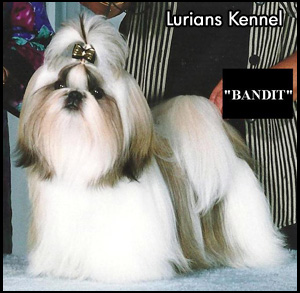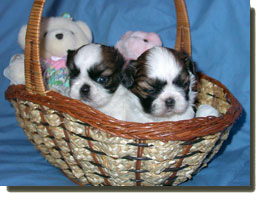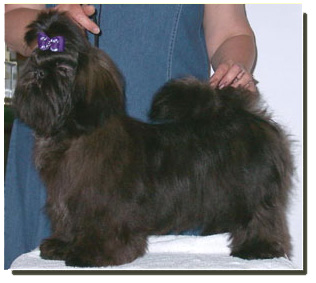
Shih Tzu
Group:
– CKC: Non-Sporting Group
– AKC: Toy Group
Origin: Tibet
Height: Approximately 9 to 10 ½ inches (23-27 cm) at the withers.
Weight: The ideal weight of the mature Shih Tzu is approximately 9 to 16 lbs. Breed type and balance are always the main consideration.

Photo Credit: Lurians Kennel
CLICK HERE to View Breeder Listings
Brief History of the Shih Tzu Breed:
It is believed that the Shih Tzu’s ancestry goes back to the temple dogs of Tibet which had been bred in that country for over 2,000 years. The rulers of Tibet and China presented these dogs as gifts to Chinese royalty. Once in China, Lhasa-like dogs were crossed with Pekingese to produce the Shih Tzu, meaning “lion dog” in Chinese. The breed was imported into Great Britain in the late 1920’s or early 1930’s and brought into the United States in the late 1950’s.
Further Reading:
— A Brief History of the Shih Tzu from the American Shih Tzu Club.
— Breed History from the Shih Tzu Club UK.
Breed Profile
The Shih Tzu has always been bred as a companion dog. His personality is outgoing, friendly, affectionate, intelligent, and docile. He is always alert and carries himself with an air of arrogance and self-importance with a warm, sweet, wide-eyed, friendly and trusting expression. The Shih Tzu thrives on human companionship, both adult and child, and needs a good deal of attention. In return, he is completely devoted to his family.
He has a dense, long and luxurious double coat with a soft undercoat that requires daily brushing.
A Special Note About “Imperial” or “Tiny Teacup” Shih Tzu:
The “Imperial” or “Tiny Teacup” are names that have been used to describe an undersized Shih Tzu. These are not exotic or rare varieties of the Shih Tzu. While all breeders may occasionally have an unusually small Shih Tzu, a reputable and responsible breeder does not breed specifically for this trait. For additional information on this subject, please see: The Facts About “imperial” or “teacup” Shih Tzu from the American Shih Tzu Club.
Health Issues
The Shih Tzu is generally a healthy and long-lived breed. However, like all breeds, some health problems have been seen within the breed, including:
- Eye Diseases, inlcuding Progressive Retinal Atrophy (PRA), Entropy, and Juvenile Cataracts. In addition, with their relatively large exposed eyes, they can be prone to eye injuries and infections and care should be taken to keep the eyes clean.
- Hip Dysplasia
- von Willebrand’s Disease
- Thyroid Disorders
- Renal Dysplasia
- Umbilical Hernia
- Autoimmune Hemolytic Anemia
If you are considering the adoption of a Shih Tzu puppy, or any breed, it is very important to be selective in choosing a responsible and reputable breeder. Ensure that the prospective puppy’s parents have all health clearances. Breeding of any dog should not be done until after they have been proven to be free of evidence of significant hereditary diseases. (For more information on selecting a breeder, see the articles on the main General Information page.)
Additional Health Resources:
- American Shih Tzu Club — Health Related Articles
- Canine Inherited Disorders Database — Shih Tzu
- Canine Health Information Center (CHIC) — Providing a source of health information for owners, breeders, and scientists that will assist in breeding healthy dogs. CHIC is a centralized canine health database jointly sponsored by the AKC/Canine Health Foundation (AKC/CHF) and the Orthopedic Foundation for Animals (OFA).
- Health and Nutrition — Growing section of the Canada’s Guide to Dogs website which includes information on several health and nutrition related issues.
- AKC Canine Health Foundation — Working towards developing scientific advances in canine health.
- Canine Eye Registration Foundation (CERF)
- Orthopedic Foundation for Animals (OFA)
- Ontario Veterinary College (OVC)
- University of Pennsylvania Hip Improvement Program (PennHip)
- HealthGene — HealthGene Corporation is the leading provider of veterinary DNA diagnostic services in Canada.
- Labgenvet — Laboratory of Veterinary Genetics is a Canadian diagnostic laboratory that offers a comprehensive service of DNA tests for veterinary genetic diseases.

Photo credit: Anjuli Shih Tzu
Grooming Information
- Grooming the Companion Dog
— From the American Shih Tzu Club. Includes casual and show top knot instructions as well as grooming techniques for the companion dog. - Care & Grooming of Shih Tzu
— From the Shih Tzu Club U.K. — Includes information on both Clipped and Show Grooming. - Grooming — This section of the Canada’s Guide to Dogs website includes tips, articles and information covering all aspects of dog grooming along with a listing of Groomers from across Canada.
Training Resources
- Training — For training information, see this growing section of the Canada’s Guide to Dogs website for tips, articles, as well as listings of training centres across Canada.
Additional Information
- Clubs, Sports & Activities — For information on the many sports and activities you can get involved in with your dog.
- Working Dogs — The Working Dogs section of the Canada’s Guide to Dogs website provides information and listings of organizations that are involved in various dog jobs, such as Guide Dogs, Therapy Dogs, Police Dogs, Protection Dogs, and much more.

Photo credit: Anjuli Shih Tzu
*NOTE 1: CHIC – The Canine Health Information Center “is a database of consolidated health screening results from multiple sources. Co-sponsored by the Orthopedic Foundation for Animals (OFA) and the American Kennel Club (AKC) Canine Health Foundation, CHIC works with parent clubs to identify health screening protocols appropriate for individual breeds. Dogs tested in accordance with the parent club established requirements, that have their results registered and made available in the public domain are issued CHIC numbers.” To learn more, visit: www.caninehealthinfo.org
*NOTE 2: The Fédération Cynologique International (FCI) is the World Canine Organization, which includes 91 members and contract partners (one member per country) that each issue their own pedigrees and train their own judges. The FCI recognizes 344 breeds, with each being the “property” of a specific country. The “owner” countries write the standards of these breeds in co-operation with the Standards and Scientific Commissions of the FCI, and the translation and updating are carried out by the FCI. The FCI is not a breed registry nor does it issue pedigrees.
Breed Listing
Quick Links
Get In Touch
- Email: canadasguidetodogs@gmail.com
- Email: info@canadasguidetodogs.com
- Visit us on Facebook: www.facebook.com/CanadasGuideToDogs
— CanadasGuideToDogs.com is an Amazon Associate as well as a participant in various affiliate programs, as such fees are earned from qualifying purchases.
